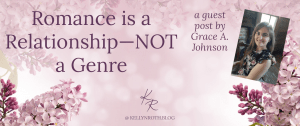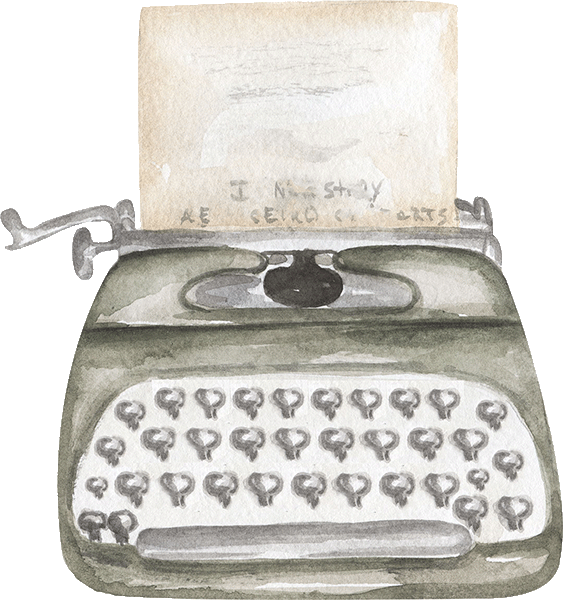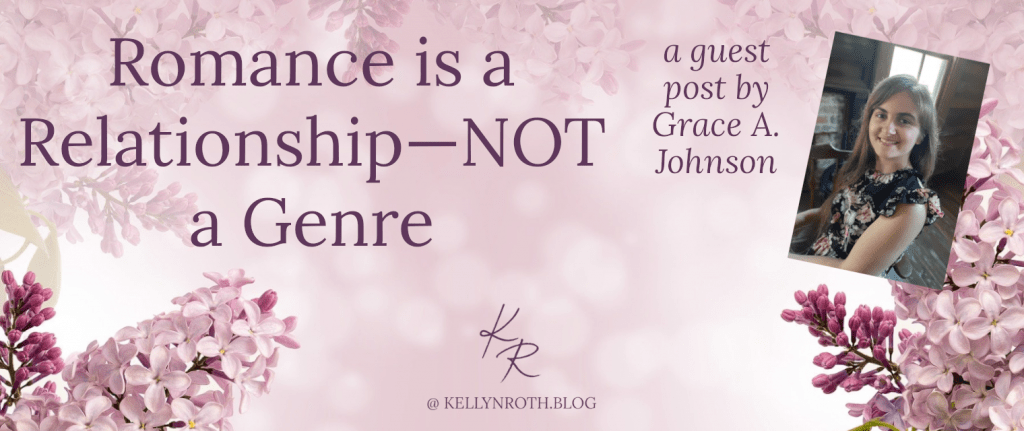
Hey folks! Welcome to my blog! For the first time in a while, we have a terribly amazing blog post … a guest post by Grace A. Johnson, one of the most incredible people in the Christian fiction world right now.
Grace A. Johnson is an author, thinker, and of course God-follower who was inspired and blessed me many times with her insightful posts and really detailed reviews. Some day I’m going to prioritize reading her novels, too! They look amazing.
One of the reasons I’m sharing this is because Grace recently released a devotional. Like Grace mentions in this article on her blog, I am also not a devotional person. I hate them, actually. But I’m very tempted to check this one out … I probably should, actually.
You can check out her devotional on Amazon. And look at that gorgeous cover!

Romance is a Relationship—NOT a Genre
The other day (Southern for last week XD), I brought up the topic of favorite/least favorite genres with a few of my fellow writers. Suffice to say I’m the only romance writer/reader in my entire friend group, so most of them threw romance into their heap of disliked genres. They’re not the only ones, for I’ve encountered a host of individuals who hate romance. (I’m sure you’ve run into a few of those…interesting folks…or you are one…)
It honestly rubs me wrong when people say they hate, or dislike, or want nothing to do with romance. Of course, I know they’re talking about books and movies saturated with romance and mushy love stories…but something still doesn’t seem right. How can you hate romance when it’s an integral part of everyday life? How can you shy away from it when you yourself are living out a love story between your spouse or significant other? How come it makes you gag when it’s what brought your parents together and what will unite you with your future mate one day?
That’s just it. The literary (and cinematic) industry have distorted the definition of romance by calling it—you guessed it—a genre. Instead of being an important part of society and life, romance (and all that it entails) is shoved into a box alongside mystery, science fiction, and fantasy. It becomes a style and a category rather than what it really is—a relationship.
There is no “just romance” or romantic “subplot.” Because romance is a relationship, it must be crafted, developed, and woven into the story as well as any other relationship. After all, we don’t call friendship a subplot, do we? It’s a deep aspect of your book, a part of your characters and themes, and it moves, interacts, and grows with every element of your story.
This is why so many writers struggle with writing romance novels and entwining romantic subplots into their stories.
They think of a romance novel as “just romance” and find themselves bored with their story, characters, and plot because they were all created for the romance. Or they think of a romantic subplot as something they can just throw into their story to spice up the plot, when it ends up becoming a nuisance and a drawback.
So how can you start viewing romance as the relationship it is rather than a genre? How can you weave it into your story in a way that’s authentic, poignant, and beneficial to the book?
I’m glad you asked! I’ve got a few tips that ought to help. Keep in mind that these are more broad, concerning any kind of romantic relationship whether it’s central in the story or it fades into the background. (This post has inspired me to write a couple articles about romance novels and romantic subplots…so y’all can find more specific advice on my blog pretty soon!)
Create the Romance for Your Story
The biggest issue (in my opinion), is that writers create a setting, characters, and plotline for the sole purpose of two people falling in love. Think of a Hallmark movie, for an example, with its quaint small town (which must have a bed and breakfast in the mountains); the new-to-town heroine who’s out of her element; the perfect (and intentionally scruffy) hero who comes to rescue; and the ex-boyfriend who’s a huge workaholic and jerk. Can’t forget the secondary cast of meddling grandmother/B&B owner and gushing friends who are quick to play matchmaker.
Everything about the story just screams a perfect happily-ever-after, right? Every element is tailored directly to the hero and heroine falling in love.
As straight-forward and effective as that may seem, that’s the main reason why Hallmark movies are so cheesy and cookie-cutter. The characters have no personality, conflicts and struggles, or wishes and dreams. The plot has no other aspects except the heroine running into the hero at every turn. I could go on.
And with romantic subplots in action and adventure movies/books, mysteries, and middle-grade or YA stories, it seems like the characters—at least one of them—were introduced into the story for the only purpose of being love interests (that’s a rant for another day). They don’t contribute to the story in any other way or have any substance to themselves.
Which is why we have got to stop creating stories for romance. We need to start creating romance for stories and not the other way around, letting the relationship flow from the characters and their interactions, becoming a part of the plot instead of taking away from it.
I mean, you can’t have a story that’s just relationship, right? There has to be conflict, a climax (besides “Oh, I love you, will you marry me?”), action, adventure, mystery—something that builds the story and develops the characters, allowing readers to connect with them and then start rooting for a romance. And this doesn’t just go for subplots. Some of the best romance novels have many other elements—yes, even Jane Austen’s.
So instead of saying to yourself “Hey, let’s write a romance!” say “Let’s create some characters with tough struggles and dark pasts, who go on an epic journey together.” Found your romance upon deep characters and developed relationships rather than founding those relationships and characters upon romance.
After all, you are your own person with fears and dreams and a life apart from sitting in the corner booth pining for your crush, right? Make your characters the same.
- Try outlining your characters with a character template before writing.
- Create playlists and Pinterest boards that reflect your characters’ personality/feelings.
- Give your characters careers, goals, backstories, and more to enhance the plot.
- Plot with your characters instead of around them by working with their lifestyles, other relationships, and reactions.
Focus on Emotional Connection + Chemistry
I cannot tell you how many romances I’ve read that are focused solely on physical attraction or physical arrangement. By arrangement, I mean that the hero and heroine fall in love because (1) they’re around each other all the time or one or the other is the only available male/female in the area. And we all know what physical attraction is, don’t we?
Now, neither of these are bad things. Physical attraction plays a lot into romantic relationships—and friendships too—and there’s nothing wrong at all with your characters being attracted to each other on a physical level. It doesn’t have to be shallow or lustful; physical attraction can actually be really sweet and pure. (Beside the point, though.) And physical arrangement can really help develop your romance, as long as they’re not together just so they can fall in love. They have to be around each other for different, more diverse reasons if you want the story to even be realistic.
The point is, though, that even though you can utilize these things and focus on them some, your main focus should be on establishing and cultivating an emotional connection between the characters and—you guessed it—chemistry.
Chemistry is actually not the same as physical attraction, believe it or not. Attraction is the north pole and the south pole, whereas chemistry is baking soda and vinegar. The first is where two similar things are drawn towards each other because of their physical characteristics, and the last is where two different things react to each other because of their makeup. For example, co-stars in a movie may have fantastic chemistry with each other because their personalities are so varied and their interactions are so genuine—and they may either hate each other or love them to death in real life! (And they may both be butt ugly, so there’s that.) When your characters start bantering back and forth, arguing every other moment, or working together in perfect sync, there’s chemistry.
But when your characters make small talk, never have any conflict, and just go about their merry ways, there’s no chemistry, and you need to drop that romance. If you try and force two characters together who don’t want to be together, you’re gonna end up with a bland, cheesy romance that is poorly developed and not engaging.
Focus on if your hero and heroine have good chemistry, and continue to develop their reactions. (As in, don’t leave them stagnant. They need to keep bubbling instead of fizzling out after a while.)
As for emotional connection…this is when your characters have something in common, unite over a shared cause, have similar struggles or values, or just have a good cry together. When they can connect on a deeper level than just personalities and appearances, you’ve got a rare relationship. So many romances stop at attraction and arrangement, and seem to forget that characters have wants and needs and goals and fears. If you can use those things to further their relationship and develop it more rather than letting your characters’ individual aspects take away from their relationship, you can guarantee a romance that’s genuine and that pulls readers in.
My two favorite ways to implement good chemistry and strong emotional connections are the popular friends-to-lovers and enemies-to-lovers tropes. Friends-to-lovers automatically have superb emotional connections, because they’re friends. They’ve already established a relationship and know each other well. They can relate, share things, have things in common, etc. Same as any other friendship.
And enemies-to-lovers have delicious chemistry (when well done, of course), because there’s conflict and anger and opposition. Whether they’re a Jewess and a Nazi or rival co-workers or neighbors fighting over a fence, you can develop their relationship beyond “Oh, I like you, you’re nice” with all the differences they’ll have to overcome. You’ll end up with a stronger romance too.
Chemistry and emotional connection are gonna be two of your best friends in writing your romance. They’ll keep you on your toes and excited about the story; they’ll help move the plot along and contribute to it in many ways; and they’ll draw your readers in and get them invested in the story and, specifically, the romance.
- Pay attention to your characters’ differences and commonalities, even if that means making a Venn Diagram. 😉
- Have fun with comedic situations, funny encounters, banter, and arguments—you can cut out what’s fluff later and keep what contributes to development!
- Learn about romance tropes and figure out which one(s) fit your characters—that’ll help guide the direction of their romance and give you examples to refer back to.
- Develop your characters’ relationship/background without their romance—whether that’s in an outline, prologue/prequel, or through backstory.
- Take a few scenes to just enhance their relationship, through conversations, collaboration, and more, without throwing in kisses and mushy speeches. XD
Don’t. Be. Repetitive.
I could turn this into a post all its own, because this really is the downfall of almost all romances (scratch that, almost all books and movies in general)…but the gist is that no matter how touching and romantic moonlit strolls, passionate kisses, and declarations of love are, you must be conservative with them. And I’m not saying that because you shouldn’t say “I love you” or because kissing is bad (all lies, in case you’re wondering); I’m saying that because these are such beautiful and meaningful things that they should be treated with honor and care, not just thrown in to make it a romance.
This goes for more generic things, like certain conversations and actions, issues and problems, and eating (for example). So many books (and other medias) have eight scenes with the characters having breakfast, or three scenes with the characters arguing over the same thing, or ten instances in which the main character thinks about this certain thing, or five books where the side character dies in each one.
Whatever it is, when you start repeating it over and over and over, readers get bored. And annoyed. And distanced from the story. By keeping things fresh and new, you’re able to retain their attention and keep them reading.
You’re also able to make a more interesting and believable romance.
Limit the dates to only two or three on page. Have them only say “I love you” once, when they really mean it. Make each kiss count by describing them differently and using them for different things (ooh, there’s another post for another day). See what I mean?
When you make each moment different and meaningful and you start focusing on how each scene enriches the plot rather than repeating everything, your romance becomes a relationship and not just the category your book is in.
- Cut out any scenes/paragraphs of fluff (moments that are unnecessary to the plot or development).
- Change up your phrasing, word choice, and descriptions so that even repeated things seem new and different.
- Add new elements like a different setting, other characters, etc., to repeated moments.
- Make romantic elements central to the plot instead of just throwing them in because you think they should be there. If a marriage proposal at the end of the book ruins your cliffhanger or disrupts an intense moment, don’t include it. You don’t have to have every single romantic thing in your book for it to qualify as a romance. All you need is love, regardless of how your characters express it.
Love Languages + Expression
Speaking of expressing love, each character is different. Your hero is different from your heroine. Your couple in Book 1 is different from the couple in Book 3. Your medieval fantasy couple in their thirties is different from your contemporary YA couple.
And that means the way they express love is different. Some guys will never say “I love you.” Some women don’t like to be touched and kissed all over. Some people will sacrifice their physical life for the one they love; others will give up all their dreams; and then there are some who would prefer to give up time or money.
When you know your characters’ personality and backstory, you can find their love language and utilize it. Love languages are one of your best friends when it comes to creating realistic, authentic relationships. Now, not everyone fits into the box—for example, I show love through gifts, but I prefer others to show me love in a different way. I also like doing things for other people, so I don’t necessarily have only one love language, and the ones I do have don’t always look the same as the generic description.
But if you know your character, that won’t matter. You’ll be able to define and describe their ways of expressing love in a manner that’s true and natural rather than just telling the reader how the character is supposed to act.
This also applies on a book basis. Even though Mr. Darcy writes long, poetic love letters and Pride and Prejudice is a slow-burn enemies-to-lovers romance, your romance doesn’t have to be the same. Just because your first romance novel was about two friends who regularly said “I love you,” your second doesn’t have to be the same.
Your story is unique, and every aspect of your story has to be consistent with the story itself—make sense? So even your romance has to fit the plot, the characters, the themes, the setting. For example, there might not be a lot of kissing in a historical romance, and there probably won’t be any poetic letters in a contemporary one—so don’t force your characters to make out if they shouldn’t or wax poetic if they wouldn’t. Just because it’s romantic doesn’t mean it needs to be included if it doesn’t fit the story. Same goes for if your story is jam-packed with action and there isn’t time for a full-fledged wedding ceremony. Pirates of the Caribbean already pulled off a wedding mid-battle; you can do it too if it disrupts your plot and pacing to start planning a huge wedding.
Make sure you respect your era and culture, your characters and their needs, and your plot. The more you do that, the more authentic your romance is.
- Research the time and place your story is set, as well as courtship customs, what was considered taboo, etc. Reading romances written during that era can help considerably!
- Research love languages and figure out how your characters’ personalities, backgrounds, etc. determine how they express love.
- Outline your plot—even if it’s just a quick run-through of how all the events will be paced—so that you can integrate your romance into it.
In Conclusion
Whew! This post was a LOT longer than I’d anticipated! Kudos to you if you read all the way through! (And if you didn’t, don’t worry. I’ll sum up. ;P)
If you feel like your romance is bland and lifeless, like you’re confined to making your story fit the genre, or like your romance is pointless and undeveloped, then just remember that romance isn’t a genre. It’s a relationship. A real life, authentic, soul-deep relationship between one man and one woman, and the best ways to portray it through fiction are:
- creating romance for your story and characters, not the other way around;
- focusing on and utilizing chemistry and emotional connection between your hero and heroine;
- keeping your story fresh and engaging by not repeating conversations, actions, etc;
- and understanding love languages and how your characters express love!
What are some other tips or tricks that might help? How do you get immersed in your characters and their relationships? Is romance easy for you to write or difficult? (Are you one of those crazies completely normal people who hate romance???) Which of these do you think you need to work on more? What are some of your favorite romance novels that go beyond the genre? Let us know in the comments below! 😀
About the Guest Poster
 Grace is a teenage authoress who has loved books since she was two years old. From Junie B. Jones to Nancy Drew, words and the worlds they create have always been a part of her. At ten years old, she felt the urge to pick up her pencil and start writing some worlds of her own. Now, six years later, she has written and self-published two novels, a novella, and five short stories. She’s obsessed with history, etymology (the study of words; not to be confused with entomology, the study of insects), Jane Austen, art, and music—and when she’s not writing, you can find her reading, snapping photos of books, cooking, and rocking out to her favorite band.
Grace is a teenage authoress who has loved books since she was two years old. From Junie B. Jones to Nancy Drew, words and the worlds they create have always been a part of her. At ten years old, she felt the urge to pick up her pencil and start writing some worlds of her own. Now, six years later, she has written and self-published two novels, a novella, and five short stories. She’s obsessed with history, etymology (the study of words; not to be confused with entomology, the study of insects), Jane Austen, art, and music—and when she’s not writing, you can find her reading, snapping photos of books, cooking, and rocking out to her favorite band.
She lives in beautiful (but humid) South Georgia, surrounded by farmland and forestry (and not as close to the beach as she’d like), with her parents and six younger siblings. Her dream is to be a wife and a mother, follow the Spirit to the mission field, and inspire other young writers to reach for the sky! You can learn more about her by checking out her blog, Of Blades and Thorns, subscribing to her newsletter, and following her on social media!

TTFN!
~Kell~
p.s.
Did you enjoy that guest post? (I was wildly impressed by it! Grace is an amazing author and has so many beautiful, true thoughts to share with the world, and I adored this post most of all!)




27 Responses
AAAAAAAAAAAAAAHHHHHHHHHHHHHHHHHHHHH KELL!!!!!!!! You are too kind!!! Thank you SOOO much for having me on your blog and for your sweet words!!! It was an absolute honor and pleasure to be able to write this post for you! 🥰
Absolutely! Thank you for writing this blog post. It was really great, and though I think a lot of this is somewhat how I think about romance (why I tend to write women’s fiction instead of category romance even though I love category romance lol) – but it still was really good to read and articulated what I believe in a way I don’t think I’d have been able to! So thank you for doing the good thinking! You definitely hit it out of the park.
You are SO welcome! 😀 Ah, I’m glad I’m not the only one, then! You definitely treat your romances better and more realistically than most category romance writers!! Aw, thank you so much!!! I’m glad you think so! <333
Thanks! Glad to hear you think so. I’m going to keep at it and hope that I can keep hitting that balance.
I know you can!
Aw, YES. THANK YOU. I get so tired of people saying it’s ‘refreshing’ when a book they read has no romance or when they brush it off as ‘fluff’ – I’m like, “We live in a fallen world where sin has distorted, romance, marriage, and sex, and you want to call it ‘refreshing’ when a book doesn’t have romance?????”
If anything, we need more romance, not less…
YOU ARE SO WELCOME. THANK *YOU*!!!! Finally, someone agrees with me!!!! I get sooo tired of that too! You are ABSOLUTELY RIGHT!!!!
YES! Exactly. I totally agree … It is so weird. So many things come down to romance that with the world discrediting it, and then Christians discrediting it, it’s so trivialized and disrespected. God created this thing – and the first human relationship WAS a marriage – and yet non-romance is so refreshing …? XD
I feel a new post coming on… 😉
Well, someone needs to write about it for sure. I guess some of it probably comes from the way romance is tossed into every media with no concern as to whether it fits or not, but still!
I’ve been wanting to write my own post about it and even have a draft…
Even though I can see the value in romance-less books, it still makes me a teeny bit sad when I read a book that lacks romance. Or worse, doesn’t have a single indication these two like each other and then they’re suddenly married at the end…or it tried to indicate but the indication came a bit too late for me to ship the characters. :/
YOU SHOULD!!! DO IT!!!
Augh, yes. Same, girl.
I know! I’ve seen those books when they’ll skip to an epilogue years later and two characters who were friends will be together, and I’ll be like, “…???” Granted, it makes sense if it’s middle grade or something, but I’d rather just see a sequel … 😉
Absolutely! STILL!
Amazing post! Thanks for sharing this, Kellyn and Grace!
Thank you so much!! It was my pleasure! 😊
All credit to Grace, of course! 😀 Thank you for reading!
This was a good, insightful post, and really made me thoughtful. Yes, I greatly enjoy reading romance novels, but I do understand people who are annoyed with books that *always* include a romantic relationship (There are, after all, other things that happen in life). And I do get annoyed when books portray a romance as naturally positive–that is, “of course you should want this couple to get together. Always root for love.” Just because romance and marriage are a good and common part of life doesn’t mean every person (and book character) *should* marry any given person “just because” they (gasp) “love” each other. I’ve just seen too many real-life situations where a marriage was almost certainly not a wise course of action.
That said, I actually often really like the romances in classics (having been reading “The Count of Monte Cristo” for the past two months), because it does portray the characters with such amorous passion, without portraying the characters necessarily being “smart” or reasonable in their romantic choices.
So, in conclusion, I agree with your post title, Grace–romance as a genre is really lacking, but it’s not something books should ignore.
CutePolarBear/Hanna
Glad I could inspire some thought, Hanna! There should definitely be more a distinction in books between attraction/lust and love, so that readers aren’t left with the idea that they should marry whomever they feel the warm fuzzies with!
Classic romances are some of the best, if you ask me! 😉
That’s very true! I think people often misinterpret what love really is, and then claim that just about anything is love, which leads to those issues. Though I think that it also comes down to people making love an all-important god rather than a practical feeling one person has for another.
Ohhhh my goodness, I ADORED this post!!!!! *bookmarks it for future reference* 😉 Romance is a relationship, not a genre… so. very. true. Putting it in its own box like that really does make it hard to put that mindset away and focus on the fact that it’s just a relationship like any other! Sometimes forgetting it’s even a “romance” helps me with that, crazily enough. XD
Thank you SO much for sharing this, Grace, and for having her on, Kellyn!!! 😀
Aw, I’m so happy you enjoyed this post, Saraina! I was so excited when I read it the first time, and I’ve returned to it a couple times after … Grace really knocked it out of the park with this one!
Thank you, girl!!! I am SO glad you did!! It really does! Haha, to be honest, I kinda do the same thing, and it really does help!
My pleasure! Thank YOU for reading! 😀